“If we are not strategic and proactive in pursuing the benefits that were achieved through the climate change negotiations, we will lose the moment and from my observation, the window is closing very quickly on this whole issue of accessing funds from the GCF. If you do not develop proposals and submit them, there is the perception that you don’t have a need. This is why we believe, it is the opportune moment for us to host and invest in this workshop. Together as a Caribbean region, it is our time to access funds from the GCF. You have the capacity to do it, we have the capacity in the region to develop our proposals to meet all of the criteria and submit it!”
These were the words of Mr. Trevor Thompson, Chair of the Global Water Partnership-Caribbean (GWP-C) at the opening of the Regional GCF Project Development Workshop organised, hosted and facilitated by GWP-C and the Caribbean Community Climate Change Centre (CCCCC). The three-day workshop was held from May 27th – 29th, 2019 at GWP-C’s Host Institution, the Windward Islands Research and Education Foundation (WINDREF) at St. George’s University in Grenada.
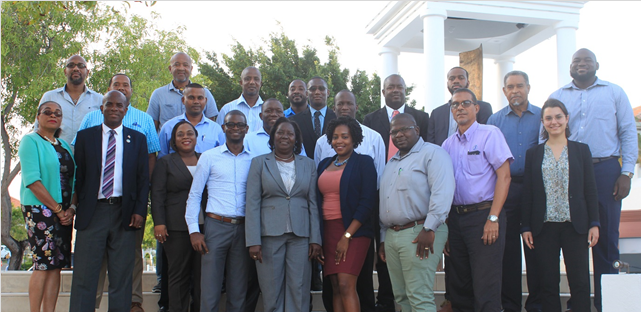
Workshop participants along with representatives from the Global Water Partnership-Caribbean (GWP-C) and the Caribbean Community Climate Change Centre (CCCC) are seen here at the 3-day regional workshop.
The workshop was titled “An Approach to Develop a Regional Water Sector Programme for Building Resilience to Climate Change.” Its focus was to strengthen the capacity of Caribbean Water Utilities and Government Ministries with responsibility for Water Resources Management, in developing climate resilient water proposals, with the objective of preparing a Regional Water Sector Programme for the submission to the Green Climate Fund (GCF).
More than twenty (20) representatives from ten (10) Caribbean countries participated in the regional workshop. These countries included: Antigua and Barbuda, The Commonewealth of Dominica, Grenada, Guyana, Jamaica, Trinidad and Tobago, St. Kitts and Nevis, St. Lucia, St. Vincent and the Grenadines and The Bahamas.
Highlights of Speakers at Opening Ceremony of Regional Workshop
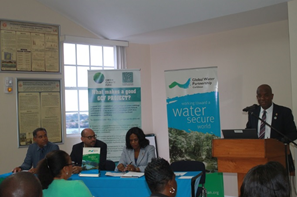
Mr. Trevor Thompson – GWP-C Chair
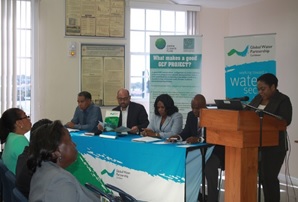
Ms. Simone Lewis – GWP-C Regional Coordinator
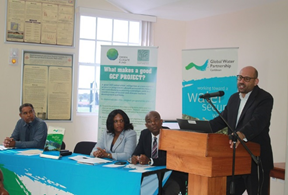
Senator the Honourable Simon Stiell – Minster of Climate Resilience, the Environment, Forestry, Fisheries, Disaster Management and Information of Grenada
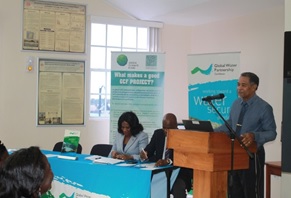
Mr. Keith Nichols – Head of the Programme Development and Management Unit at the CCCCC.
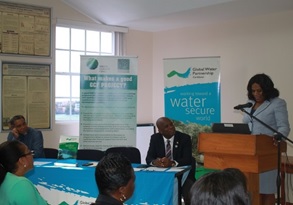
Mrs. Roxy Hutchinson – Permanent Secretary in the Ministry of Climate Resilience, the Environment, Forestry, Fisheries, Disaster Management and Information of Grenada
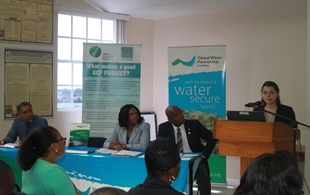
Ms. Sara Oppenheimer – Network Specialist at GWP
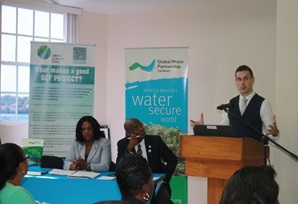
Dr. Randall Waechter – Programme Manager for Research Administration at WINDREF
As detailed in Mr. Thompson’s opening remarks to kick-off the workshop, he impressed upon the more than twenty (20) participants, that it was now or never to submit climate related water projects to the GCF. Adding to Mr. Thompson’s message to workshop participants was Mr. Keith Nichols, Head of the Programme Development and Management Unit at the CCCCC. In his welcome remarks at the workshop, he said “The GCF is running out of monies; a lot of big countries and big institutions are drawing down resources from the GCF and replenishment is not yet in sight for the GCF, so we have a challenge to find some bankable projects to submit to the GCF in the quickest time possible. Water is if anything the single most important commodity in our countries. Our economies will not survive without water; water is health, energy, climate change, it is our tourism, agriculture and food security. The Regional Framework for Achieving Development Resilient to Climate Change, recognises that water is the key cutting issue in the whole mix of sector development in the countries, which is why we are here today.”
Senator the Honourable Simon Stiell, Minster of Climate Resilience, the Environment, Forestry, Fisheries, Disaster Management and Information of Grenada delivered the feature address at the workshop’s opening ceremony. In his address, Minister Stiell stated “of all the threats and impacts of climate change on our water sector and all the areas that are negatively impacted by climate change, there can be nothing more sensitive or more critical than water; it speaks to the fundamentals of life.” Mrs. Roxy Hutchinson, Permanent Secretary in the Ministry of Climate Resilience, the Environment, Forestry, Fisheries, Disaster Management and Information of Grenada also gave an address at the workshop. She said “Our Ministry continues to support government and Caribbean initiatives aimed at changing our status, as some of the most water stressed countries in the world. This workshop today is therefore very timely, and it will help us to examine strategies that will allow for better management of Caribbean water resources in a more integrated manner.”
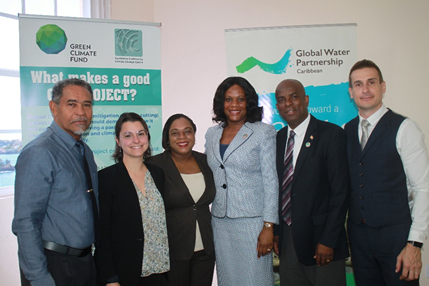
L – R: Mr. Keith Nichols, Head of the Programme Development and Management Unit at the CCCCC, Ms. Sara Oppenheimer, Network Specialist at the GWP, Ms. Simone Lewis, GWP-C Regional Coordinator, Mrs. Roxy Hutchinson, Permanent Secretary in the Ministry of Climate Resilience, the Environment, Forestry, Fisheries, Disaster Management and Information of Grenada, Mr. Trevor Thompson, GWP-C Chair and Dr. Randall Waechter, Programme Manager for Research Administration at WINDREF at the opening ceremony of the Regional workshop.
Ms. Simone Lewis, GWP-C’s Regional Coordinator who also provided remarks at the opening of the workshop said “It is an opportune time to renew contacts and discuss problems and challenges of mutual interests in the water sector with delegates of the countries represented.” Ms. Lewis also stated that “No matter how much we can do by ourselves on the national level, whether it is by research or development, it is never enough, hence the reason for an elaboration of a Regional Programme to address our approach to the implementation of IWRM in the Caribbean. In a spirit of true cooperation, we in the Caribbean region must join in an action–oriented approach, to attack and solve the problems that beset land and water development. We therefore need to adopt a holistic approach, from different angles and perspectives to address the sustainable use of such a critical and important resource, water.” Also providing remarks at the opening ceremony was Ms. Sara Oppenheimer, Network Specialist at the Global Water Partnership (GWP) and Dr. Randall Waechter, Programme Manager for Research Administration at WINDREF.
The three-day workshop was very hands-on and interactive, providing participants with a wealth of knowledge on the GCF and funding opportunities. They also learnt about:
- The National Adaptation Plan (NAP) Process and the Role of GWP-C in the Process (Presentation by Mr. Trevor Thompson)
- Addressing Water in NAPs (Presentation by Ms. Oppenheimer)
- The GCF Concept Note Development (with Climate Rationale) and Funding Proposal Template
- The Logical Framework/Theory of Change in the GCF Concept Note Development
- The GCF Six (6) Investment Criteria
Some Presentation Highlights
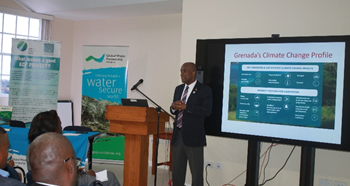
Mr. Trevor Thompson, GWP-C Chair is seen here delivering a presentation on the NAP Process and the Role of GWP-C in the Process.
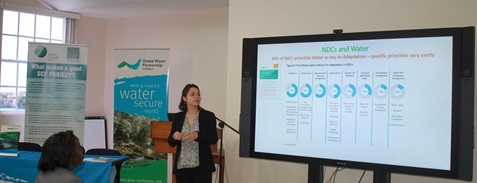
Ms. Sara Oppenheimer, GWP Network Specialist is seen here delivering a presentation on Addressing Water in NAPs.
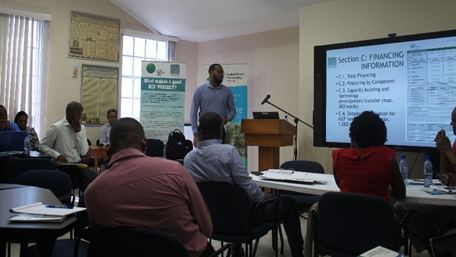
Project Specialist at the CCCCC, Dr. Donneil Cain is seen here delivering a presentation on the development of the GCF Concept Note at the regional workshop in Grenada.
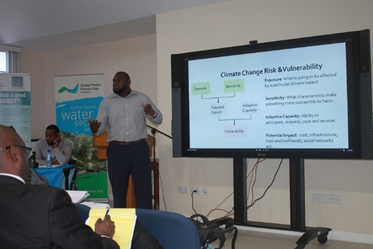
Project Specialist at the CCCCC, Mr. Ryan Zuniga is seen here delivering a presentation on the development of the GCF Concept Note.
Participants were also able to:
- Identify potential activities for a regional programme (water and climate) to take forward to the GCF.
- Present their project ideas and log frames.
Some Highlights from Group Exercises
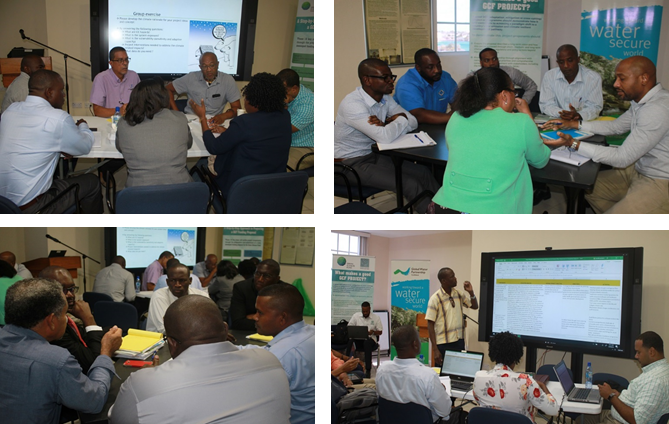
Snapshots of participants during various group exercises geared to help them develop their GCF Concept Notes.
GWP-C had the opportunity to get feedback from many of the participants on their key learnings from the workshop. What was undeniable about the workshop based on the responses from participants was:
- The inter-country sharing among participants on the GCF process, project ideas and experiences was invaluable.
- It was evident that despite differences amongst countries, there were very distinct similarities as Small Island Developing States (SIDS) in terms of water projects with climate rationale.
- Some participants expressed that they had never fully understood the GCF Concept Note Development Process until the workshop, having been exposed to it to some extent before.
A major outcome of the workshop was that over twenty (20) participants at the workshop, each submitted a completed country specific project idea and logframe. GWP-C together with the CCCCC, will work together to ensure that follow-up is done with the participants on the logframes, so that they are turned into submissions to the GCF. Additionally, the logframes will also help to identify key commonalities among the project ideas, for the development of a Regional Water Sector Programme for Building Resilience to Climate Change.